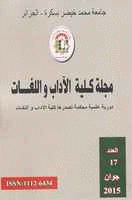To *be exist or not to *be exist ? That is the Question
Résumé
يتمحور هدا البحث حول الاستعمال الخاطئ للفعل يكون من طرف طلبة اللغة الانجليزية من التعليم العالي بجامعة أدرار. يتكون الجزء الأساسي للبحث من أكثر من ألفين ورقة امتحان للسداسي الأول و الثاني لعشر مواسم جامعية. أساس فرضية البحث هو أن الاستعمال الخاطئ للفعل يكون لا ينجم عن الطلبة بل هو ناتج عن للتدريس الخاطئ لكيفية استعماله في مدارس الطور المتوسط و الثانوي.
This corpus study analyses the wrong use of the verb to exist as *to be exist under various forms and tenses such as *is exists, *are existed, *does not exist, and *existness. The corpus consists of more than two thousand exam copies for the academic years 2003 through 2013 held at the university of Adrar, Department of English. Error Analysis considers a fault as mistake or error depending on its frequency of repetition and on its over or under-generalisation to the learners. The research contends that this mistake/error is not the learners’ deed, but is taught to them under that erroneous form in intermediate or secondary schools. To substantiate this argument, the survey shows that the wrong verb to *be exist is used by students from different levels (Classical and LMD systems) with different educational and geographical backgrounds.
Références
Benrabah, M.1999. Langue et Pouvoir en Algérie: histoire d’un traumatisme linguistique. Paris: Séguier.
Benrabah, M.2002. Ecole et plurilinguisme en Algérie: un exemple de politique linguistique négative. Education et Sociétés Plurilingues 13:73-80.
Bhela, B.1999. Native language interference in learning a second language: Exploratory case studies of native language interference with target language usage. International Education Journal 1:(1)22-31.
Cherouana, R., 2010. Teaching Pronunciation to Young Learners in Middle Schools in Algeria, unpublished Master Dissertation, Mentouri University – Constantine, Algeria.
Corder, S.P. (1973). Introducing Applied Linguistics. Middlesex: Penguin.
Corder, S.P. (1987). Error Analysis and Interlanguage. Oxford: Oxford University Press.
Dudley-Evans, A., & St. John, M. J. 1998. Developments in ESP: A multi-disciplinary approach. Cambridge: Cambridge University Press.
Dulay, H., Burt, M. & Krashen, S. 1982, Language Two, Oxford University Press, New York.
Ellis, R. 1984, Classroom Second Language Development: a Study of Classroom Interaction and Language Acquisition. Oxford: Pergamon Press.
Ellis, R. (1997). Second language acquisition. Oxford: Oxford University Press.
Erdoğan, V. 2005. Contribution of Error Analysis to Foreign Language Teaching, Mersin University Journal of the Faculty of Education 1(2): 261-270.
Gardner, R.C. & Lambert, W.E.1959. Motivational Variables in Second Language Acquisition. Canadian Journal of Psychology 13: 266–272.
Hisham, D. 2008. Needs Analysis of Arab graduate students in the area of EAP: A case study of the ICT program at UUM. Unpublished minor thesis. Sintok: University Utara Malaysia Press.
Kambal, M. (1980). An Analysis of Khartoum University Student’s Composition Errors with Implication for Remedial English in the Context of Arabicization. PhD Dissertation. University of Texas at Austin. USA.
Keshavars, M.H. (1997). Contrastive analysis and error analysis. Tehran, Rahmana Pub.
Lakehal-Ayat Bermati, K. 2008. Is the Algerian Educational System Weakening? An Investigation of the High School Curricula and their Adequacy with the University Curricula. Thesis submitted in candidacy for the degree of doctorate és-Sciences in Applied Linguistics.
Lott, D.1983, Analysing and counteracting interference errors, ELT Journal, vol.37/3, pp 256- 261.
Rabab’ah, G. (2003). Communicating Problems Facing Arab Learners of English. Journal of Language and Learning 3(1), 180-197.
Rezig, N. 2011. Teaching English in Algeria and Educational Reforms: An Overview of the Factors Entailing Students Failure in Learning Foreign Languages at University. Procedia-Social and Behavioral Sciences 29:1327-1333. Acts of the International Conference on Education and Educational Psychology (ICEEPSY 2011)
Richards, J.C. et al. (1992). Dictionary of language teaching and applied linguistics. Essex,
Spolsky, B. 1969. Attitudinal aspects of second language learning. Language Learning 19:271-275.
Spolsky, B. 1989. Conditions for Second Language Learning: Introduction to a General Theory. Oxford University Press.
Tahaineh, Y.S. 2010. Arab EFL University Students Errors in the Use of Prepositions. MJAL2:1
Zughoul, M., & Taminian, L. (1984). The linguistic attitude of Arab University students: Factorial structure and intervening variables. The International Journal of the sociology of Language 50:28-45.
This point is well commented on by Widdowson (1994) who says: "the native speaker teachers are generally equipped with knowledge only in a privileged intuitive sense, and with pedagogic competence only to a rudimentary degree… the nonnative speaker teachers know the “subject”, English, in an explicit rather than intuitive sense, by virtue of having themselves learnt it as a foreign language."
And, starting from 1996, the minister of education at that time decides to promote English at the expense of French.”
According to Gardner and Lambert (1959) there are two types of motivations, Integrative and Instrumental. Integrative motivation characterizes the foreign language learner who shows a real interest in the culture of the target language, and who would like to be part of it. The instrumental, on the other hand, is a feature of those who learn foreign languages for utilitarian aims, such as getting a job, communicating with foreigners or chatting, etc.
Vecide Erdoğan, Mersin University Journal of the Faculty of Education, Vol. 1, Issue 2, December 2005, pp. 261-270. He says that: “Error analysis enables teachers to find out the sources of errors and take pedagogical precautions towards them. Thus, the analysis of learner language has become an essential need to overcome some questions and propose solutions regarding different aspects.” (p. 263)
For Ellis (1997: 51) a ‘transfer’ is 'the influence that the learner’s L1 exerts over the acquisition of an L2'.


